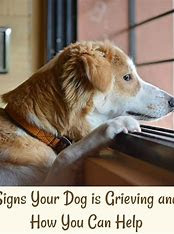DO DOGS GRIEVE OTHER DOGS?
Yes, it is true that we can't just ask them and get an answer, we must observe them and most all of the evidence seems to point to the answer of, 'Yes!" They do experience some form of grief in one way or another. It is very likely that they feel all of the emotions that go along with grief when they lose both human and/or canine companions during their lives.
There are many instances of dogs grieving over the loss of their owners, some of which have been made into movies. One example is the movie Hachi. It is a true story and is well worth your time to watch if you missed it.
Also, there are studies that show that dogs grieve for their close canine companions as well. I have included some tips for identifying their grief, just in case you may have missed it. Also, in my research, I found some ways that we can use to help our fur babies after the loss of their pal. This is from an article by Barbara J. King in Scientific American that revealed how dogs experience behavioral changes after the death of a fellow pup.
Dr. King is a professor emerita of anthropology at the College of William and Mary and explored the topic in her book How Animals Grieve. She states that we can only evaluate what we can see in the dogs' behavioral changes. Something may show up quickly, such as a social withdrawal. He could decide not to eat or drink normally and even continue to search for his companion or vocalize his stress.
Of course, they may not fully comprehend the concept of death and all of its metaphysical implications, but they do know that another dog in their life is missing It is a situation where they have lost the companionship when the other dog is no longer around. Some other examples of grieving may be lethargic behavior or sleeping more than usual, possibly aggressive or destructive behavior, inappropriate elimination in their home, or calling out/howling unusually for their companion. Possibly even continued searching for their friend or becoming extra clingy to their owner.
These are all normal behaviors and should not be harshly punished. Instead, our fur babies need reassurance with lots of love and praise and gentle discouragement from destructive behaviors, including redirecting them.
It has been noted that dogs can form emotional attachments to people and to other dogs. Just as with people, not all dogs react the same after the loss of another dog in the household. If there was a close bond, the dog may react with the behaviors that indicate depression. They may lose their 'spark' and seem less perky, attentive, and active. Each dog, just like people, will grieve differently.
Dogs also pick up on our grief. They watch our facial expressions, moods, and postures. Dogs are smarter than we give them credit for. They know when their human is feeling stressed. There is nothing wrong with giving your fur baby an extra treat, or an extra hug or walk or just to cuddle with you.
The length of time also varies from dog to dog, just as it does from person to person. Typically, it has been shown in studies that it lasts anywhere from two to six months.
Sometimes the answer is to eventually look for another dog companion. Just don't be too quick about it. Allow your dog to grieve and have some alone time. No one, not even a pet, can be replaced but if your fur baby needs a companion to play with and cuddle with while you are at work, another dog just may help. At least try to set up play dates with other dogs, even a doggie day care to play and start to enjoy life again.
The most important thing of all is to just be there for your pet and to give them all of the attention and love they may need to recover from the loss of their friend. That, in turn, will help you recover from the grief too.
I am speaking from experience. Our Davis was 2 years old when we brought Maggie into his life. We actually took him with us so that he could help pick out a playmate. They chose each other. Davis loved her and protected her from the very beginning. They were never apart from one another.
When Davis was 6 he became very ill very quickly. We went straight to the specialist vet and we had no choice to make except to make him at peace. When they carried him in to me he put one paw on my foot and rested his chin on it and looked into my eyes with his soulful look that told me he knew that it was time and that he loved me. I also knew that he would be crossing the rainbow to be with Steve, my husband. Steve loved both of our doodles but Davis was definitely just like Steve. Such a jokester! It was such a sad day and I believe with all of my heart that Davis missed Steve so very much when all of a sudden he was not around. He did have Maggie here but I did not notice any behavior issues. He was such a sweetheart and continued to play catch me if you can jokes on all of the family members. I felt like he was trying his best to somehow get Steve to show up again. Just my thoughts on how he was behaving through my observations.
When I came back from the vet clinic with no Davis -- I knew Maggie picked up on my grief and sorrow. She went to Davis' crate where the doors were always opened and just plopped down on all of the blankets that had his scent on them. Davis carried his blankie around, sort of like a toddler does. Maggie never did but she went in to have some alone time and just get his scent.
I noticed her perkiness was not there. She was always so prissy and sassy. The one very good thing that seemed to help her some was that my daughter, son-in-law and granddaughters moved in to help me deal with Steve's passing. And then a few months later, we lost Davis. They had a little dog that came along too. Ryder was simply the best thing in the world for Maggie. Even for me.
Continuing with routines with Maggie and loving her with all of my heart, as well as her new live-in family and dog companion, Ryder, helped her finally come out of her depression. I can say that she now is very close to the Maggie she has always been. She really is connected to this new routine, a new fur baby companion, and the life as we now know it.





















